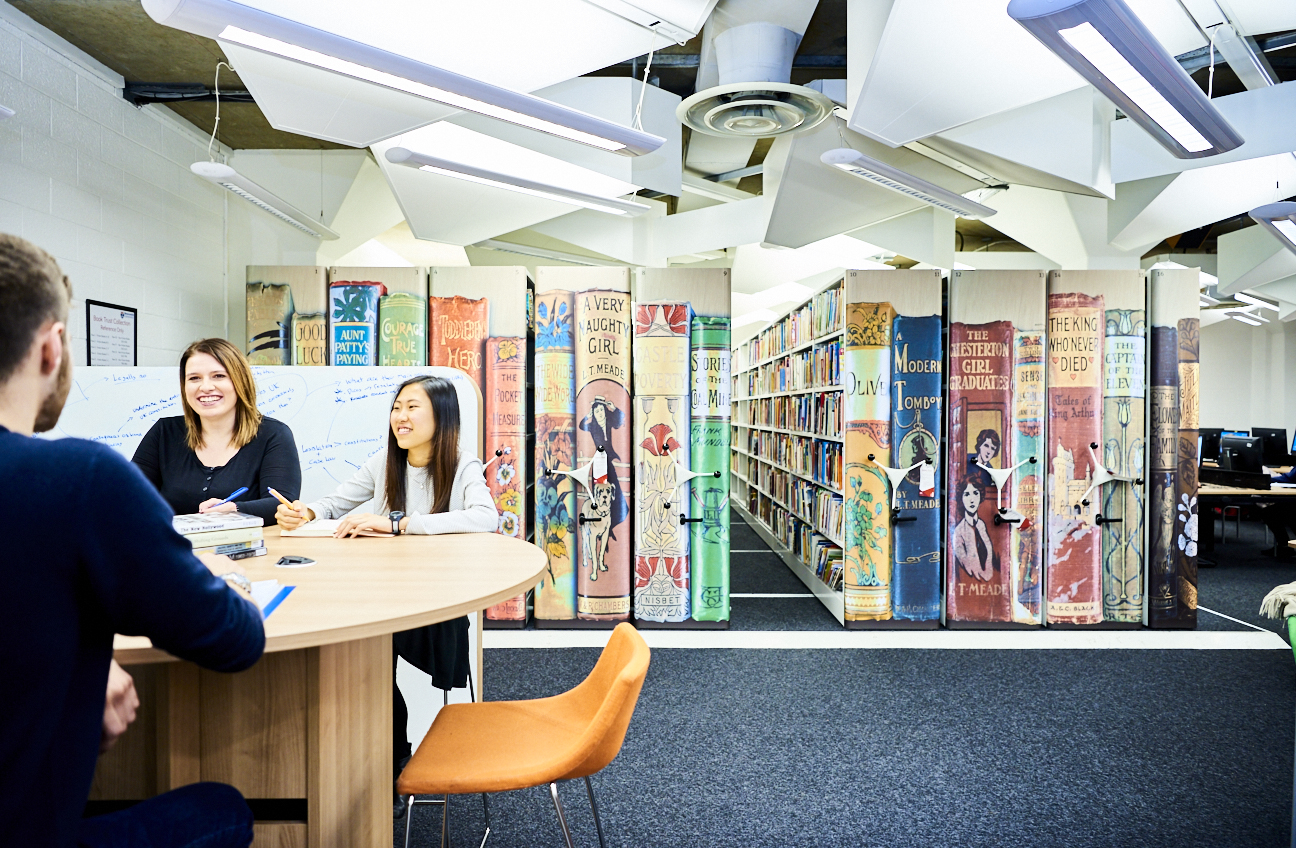Welcome to the University Library
A very warm welcome to the University Library!
Whether you’re a fresher or a final year student we want to help you get the most from your Library. From discovering resources to finding the right study space, to where to go to get help with your coursework. So, here are a couple of ways you can settle in and join in at the Library:
Virtual Escape Game and Prize Draw
There’s something strange going on at the Library – something about dangerous magical beasts and impossible riddles. It all sounds like an elaborate freshers’ week prank…but what if there’s something more going on?
Challenge yourself to our exciting Escape Game and enter our prize draw to be in with a chance of winning a £25 Amazon voucher! (There are five runner-up prizes too, so lots of chances to win!) Play individually or work with a team of friends on Zoom (or other video conferencing tool of choice) to solve the puzzles and save the Library!
Newcastle Beginnings
The Liaison Team have been working alongside services from across the University to create and deliver our Library induction online as part of the Newcastle Beginnings programme. Available to all students in Canvas, it is designed to enable new students to get started with the Library and act as a refresher for returning students. You’ll find an introduction to our services, an overview of the resources and support available for your subject area, guides on how to get the best results from Library Search, and advice on accessing materials and support from the Library wherever you are studying this semester.
At the Library
Have you spotted our Click and Collect service or the Book a Study Space system yet?
This year’s rather unique circumstances mean that we’re managing our services and facilities more flexibly and that things may change at short notice. The best way for you to keep informed and up to date on availability of study spaces, and access to facilities and resources is to keep a weather-eye on the Library website, which will be regularly updated with any important changes.
We’ll be adding notifications to the Library pages of the University app and sharing news via our Twitter and Instagram pages too.
Want to ask us a question?
Library Help is available 24/7 – you can browse our FAQ database by topic or search it by using keywords; send us an email or chat with us about your query. We’re happy to help!
New resources for Science, Agriculture and Engineering 2020
We have been very busy over the summer adding to our growing collection of e-resources to support your studies and research. Discover individual titles in Library Search and browse some of the new collections now available to you below.
- American Society of Mechanical Engineers (ASME) digital collection
- De Gruyter Princeton Mathematical
- IEEE Wiley ebooks library
- IET Digital Library books
- IOP ebooks (including concise physics, expanding physics and AAS-IOP Astronomy collections)
- IEEE MIT Press ebooks
- Morgan and Claypool Synthesis 11
- Oxford Handbooks Online Business and Management
- Oxford Handbooks Online Economics and Finance
- Oxford Handbooks Online Physical Sciences
- Sage Business Cases
- Science of Synthesis
- Springer ebooks (including 2020 collections in biomedical and life sciences, computer science, earth and environmental science, engineering, intelligent technologies and robotics, medicine and social sciences)
- Synthetic Methods of Organometallic and Inorganic Chemistry (10 volumes)
- World Scientific ebooks (including 2020 collections in computer science, engineering, environmental science, life sciences, medicine and healthcare, physics and astronomy, non-linear science, chaos and dynamical systems)
We have also invested in continued access to our Evidence-Based Acquisition (EBA) collections from multiple publishers, so you can browse and access hundreds of ebook titles and we can see which are the most popular titles for our students and researchers.
It’s as easy as…Reading Lists
As an academic, there are 5 easy steps to creating your own reading list on Leganto, our Reading Lists service, for your students:
- Access or create your reading list via your VLE (e.g. Canvas).
- Add resources from Library Search and other sources (e.g. Blackwell’s Book Shop).
- Tag each item using the appropriate tag (i.e. essential, recommended or background reading), where:
Essential = very important to the course, all students will need to use this text.
Recommended = supplementary texts which students are encouraged to use.
Background = additional texts which are suggested for background subject area reading. - Send your list to the library for checking and stock orders.
- Publish your list to ensure your students can access it.
Things to know:
Tagging each item with essential, recommended and background can generate book orders: there are book/student ratio ordering criteria for items being added to library stock and tagging will allow informed decisions to be made by the Library’s team.
Given we are in the midst of a pandemic and teaching is being undertaken in a different way this term, the Library will attempt to obtain access to all resources online (e.g. e-books) where possible. Please note we do try our best but not everything is available online! Where we can’t obtain an online resource, we will usually opt for the print instead.
There is a Canvas course prepared for you to learn how to use Reading Lists. It’s short and full of useful information on making the best use of the service for your students. Self-enrol on Reading Lists Training for Staff today.
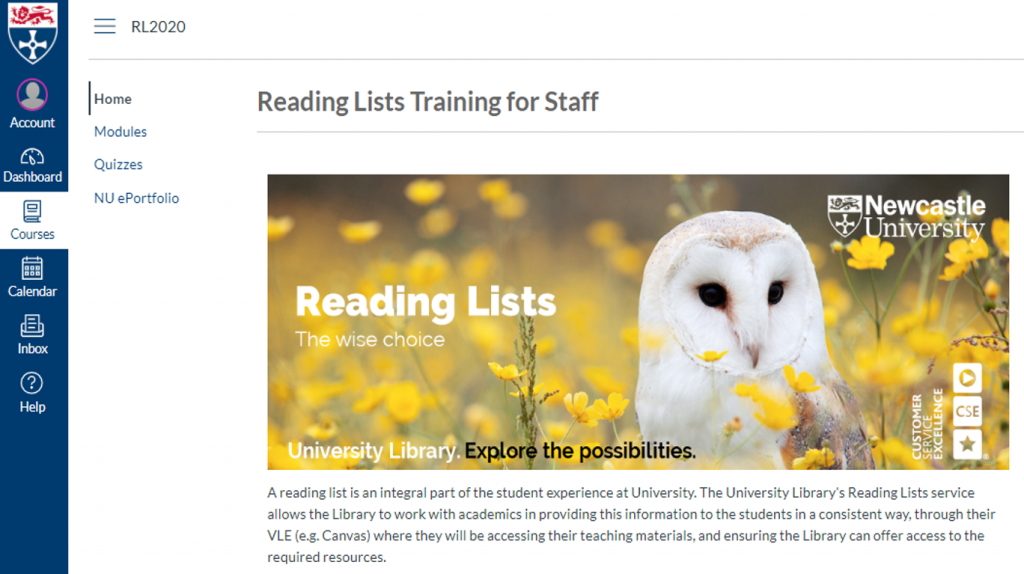
If you would prefer to submit your reading list or lecture/seminar handout to a dedicated team of Library staff to be processed, use the submission form or email the lists to readinglists@ncl.ac.uk for support.
So, Reading Lists are a great way to let your students know what they need to read, and to keep the Library informed too; they are the wise choice.
Reading Lists and Canvas
The University’s Virtual Learning Environment has been changed to Canvas. After years of using Blackboard, it’s a bit different! But once you start to use it, you’ll find it’s much easier to present the information your students need, to communicate with your students in word, sight and sound, and to work more easily in this online world brought on us by the pandemic.
Why talk of Canvas when this post is about Reading Lists? Well, Canvas makes your reading list for each module more visible so you are more likely to be asked about the lists by your students.
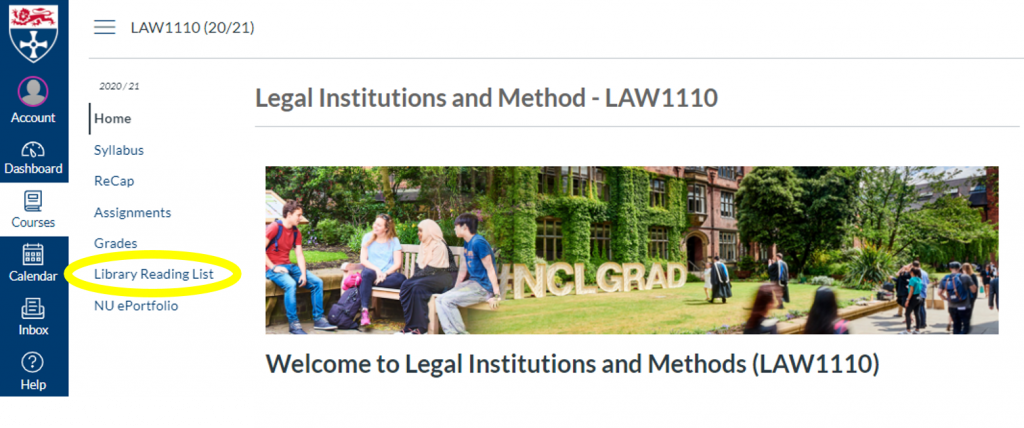
The LTDS Canvas Baseline states ‘…where relevant a reading list must be provided.’

So what you should do? Not all modules will need a reading list. But if you do have books, book chapters or journal articles you want your students to read and would like to learn how to manage items on your Reading List yourself, please self-enrol on the Reading Lists Training for Staff course which is available via Canvas. It will explain each stage of creating and editing your lists and will allow you to keep in touch with the Library about the materials you need to support your teaching.
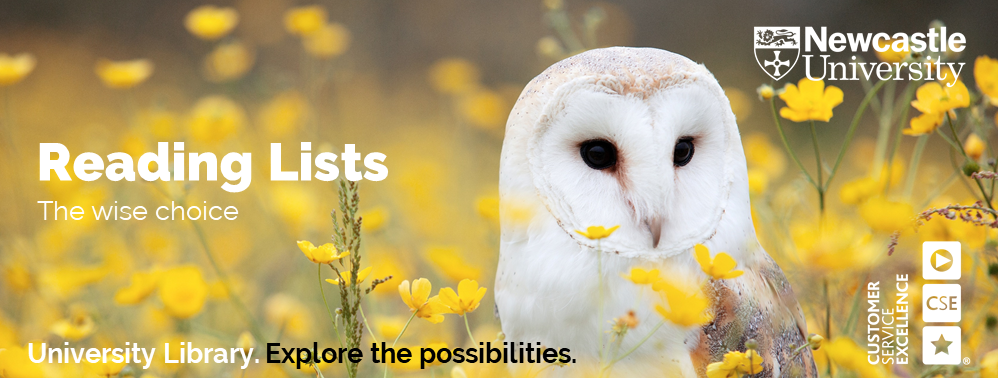
Alternatively, you may wish to produce your reading list in a Microsoft Word document, or module handbook, and submit this to our dedicated Library Reading Lists team to create your online version.
If you have any questions about Reading Lists, please contact Library Help and a member of the Reading Lists team will be in touch.
Reading Lists
A reading list is an integral part of the student experience at University. Although it may be viewed as an archaic term these days, students are ‘reading’ for a degree. How do the students know what to read? It is the academic’s role to guide them.
The University Library’s Reading Lists service (Leganto) allows the Library to work with teaching staff in providing this information to the students in an online and consistent way, through their Virtual Learning Environment (Canvas or the Medical LE) alongside their teaching materials.
The University Library’s Reading Lists service is routinely promoted to the students throughout induction. It contains essential, recommended and background reading for modules taught within Newcastle University. Now we’re using Canvas, it also appears in the standard menu within each course and will be more accessible than in our former VLE.

So, as teaching staff, what are the benefits of using this service?
- You have control and can create, manage and update your own reading lists online.
- The Library will ensure online access to resources (if available). If an e-book is not available then the correct number of print copies will be purchased based on the essential, recommended or background reading tags you apply to each item on your list.
- Essential, recommended and background reading tags help students prioritise their reading.
- CLA scans (digitised book chapters and articles) can easily be requested and acccessed through Leganto. There will be no need to email us or fill out a web request form; simply tag the item on your list and the Library will do the rest.
- The same principle applies to new books. Once on the reading list this information will trigger adding new material to our stock – there will be no need to contact us separately.
- You can export a reading list to your module guide or handouts. This will save you time by only needing to create the list in one place.
Using this system is a wise choice as it ensures the Library knows what you need to support your teaching and will offer your students direct access to the required resources.
You can find more information on this service via our website, or contact the reading list email.
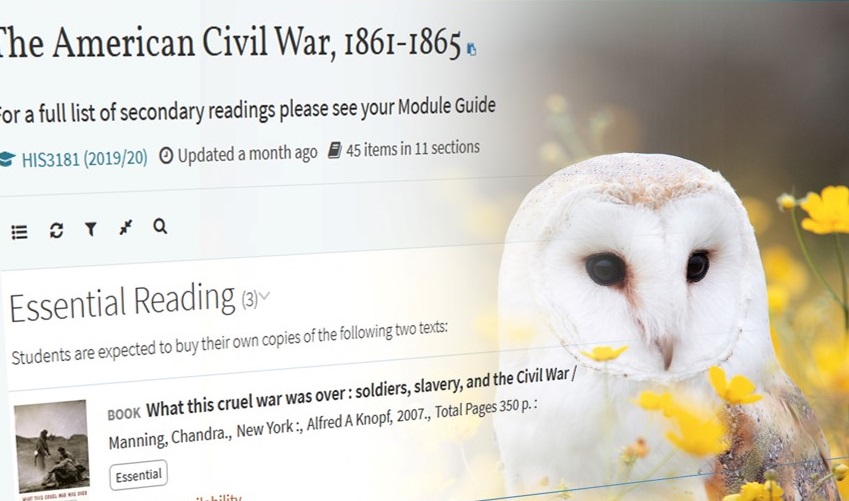
Make the most out of your library’s resources

Key resources
Do you have an assignment or research question and don’t know where to start? Search no further, your subject-specific LibGuide is only a few clicks away.
Follow the link above and then choose the Faculty and relevant School. Once you are there you will see the key resources that are provided for you:

Navigate to the ‘Journals and Databases’ tab. This will display the databases where you can search for the journal articles that you need. Don’t know how to use this avalanche of links? We have instructions:

From the Databases tab, click on the next tab along, in the centre of the screen that reads ‘Journals and Database Help’.
One-to-one help
Is the information too vast and you feel like you’ve hit a wall? You can ask your liaison librarian team for help. From the same navigation menu on the left side of the screen, click on ‘Subject Help and News’. There, you can find the team’s contact details and further down the page, you can request to book a one-to-one consultation with a member of the team.
Academic skills
Do you feel that your academic skills need to be polished a little? Don’t hesitate to look at our Academic Skills page from the Subject Support page:

You will find more guides on this page relating to how to find academic information, reference it, using EndNote, distinguishing between real information and fake news and many more.
Academic Writing
You can also get one-to-one help from the Writing Development Centre if you are struggling with study skills or academic writing.
Library Help
Do you have any specific questions? Please contact us via Library Help where we monitor your live chats and emails or have a look through our FAQs.
Spotlight on World Scientific eBook Collections

World Scientific Publishing (WSP) is an academic publisher of scientific, technical, and medical books and journals with headquarters in Singapore. WSP publishes about 500 books annually as well as more than 150 journals in various fields. World Scientific eBooks are electronic versions of World Scientific print titles.
The titles span across a wide variety of subjects, including:
- Asian studies
- Business & Management
- Chemistry
- Computer Science
- Economics & Finance
- Engineering
- Life sciences
- Mathematics
- Physics & Astronomy
- Social Sciences
Once connected, you can search for titles within a specific subject:
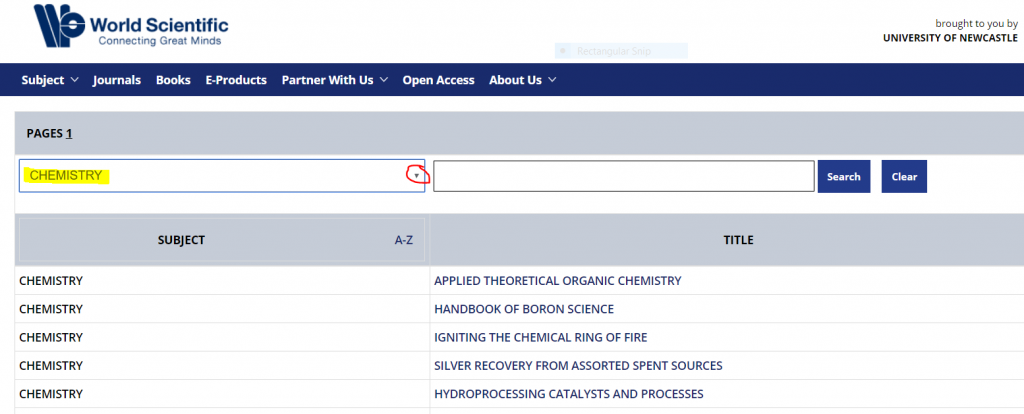
Or for titles on a specific topic :
If you’re searching for titles directly through the World Scientific platform, look out for the “Full Access” symbol to make sure we have access to the full text content:

You can also search for individual titles on Library Search:
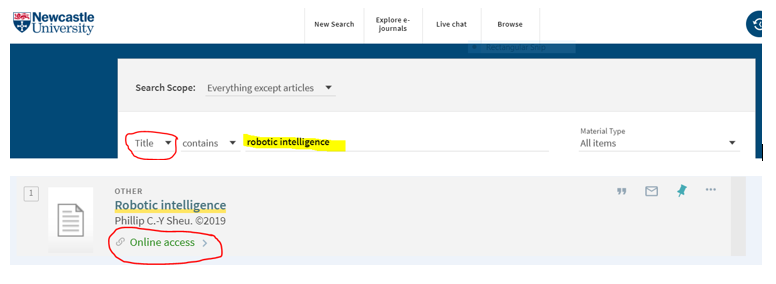
A user guide is available on the Library Subject Support guides and you can download from the link below:
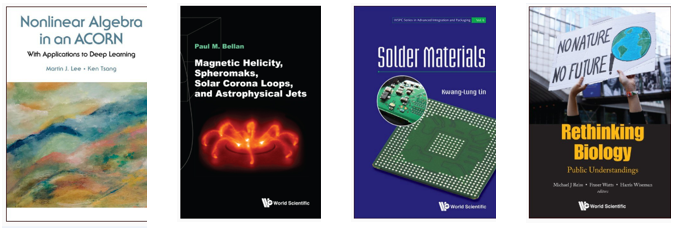
New resource: Oxford Handbooks Online
The Library has bought permanent access to several collections in the Oxford Handbooks Online series.
This provides access to 250 handbooks in various subject areas across humanities, social sciences and science, in addition to collections we had previously bought. The new collections are:
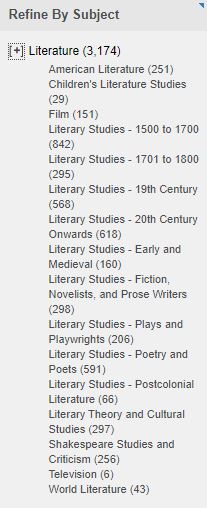
You can access the content in various ways: for example, you can browse by the broad subject areas, to view individual books, and/or the articles within those books.
Once in a subject area, you can then refine your search to more specific sub-disciplines.
You can also search in various ways, e.g. by author or keyword.
The handbooks are all being individually catalogued and will be accessible via Library Search shortly.
SciFinder – a one-stop shop for chemical reactions, substances, and scientific literature.
SciFinder is a research discovery application that provides integrated access to the world’s most comprehensive and authoritative source of references, substances and reactions in chemistry and related sciences.

Accessible via Library Search this powerful, chemist-curated database from CAS offers reference, substance and reaction searching with sophisticated analysis tools. Substances can be searched by chemical structure, markush (for Patents), molecular formula, property or substance identifier. All alternative substance names are listed alongside CAS Registry numbers and commercial sources. Popular in industry, this database is vital for students and researchers in chemistry, pharmacy, forensic science, medicinal chemistry and chemical engineering.
To use SciFinder you must register and sign in when prompted. On doing so you can then set personal preferences, explore resources, and save your own searches. You can also browse your search history and set up alerts and notifications.
SciFinder Mobile allows you quick and easy access to references of published scientific research and information on substances of interest (including nomenclature, molecular formula and properties) from your smartphone.

If you’d like to know more or need a little help to get started CAS provide a range of online support and training. There are also a selection of instructional videos available on YouTube.
So get registered, sign in, and explore. You’ll be inputting structures using the drawing editor and conducting substructure searches in no time!

